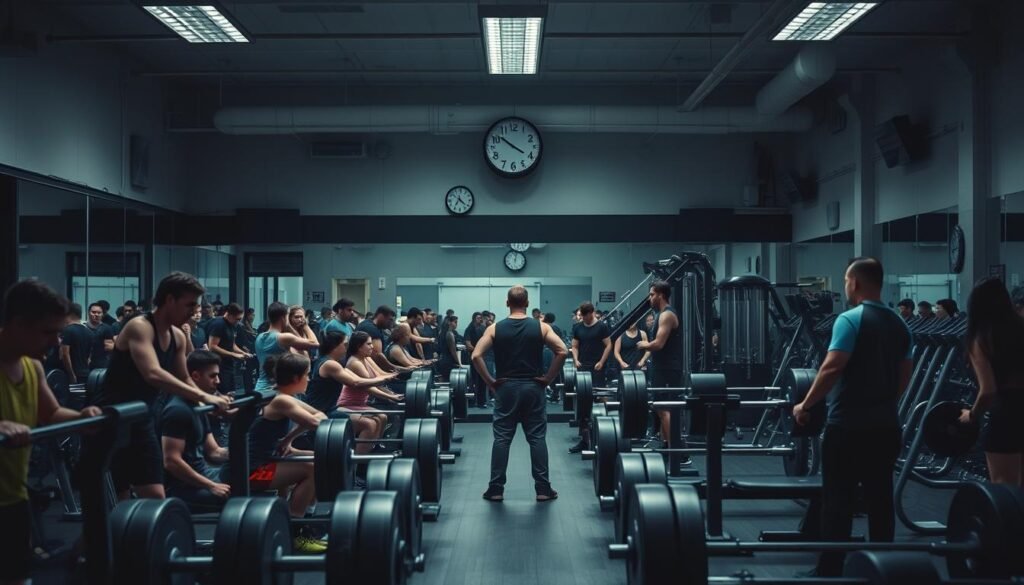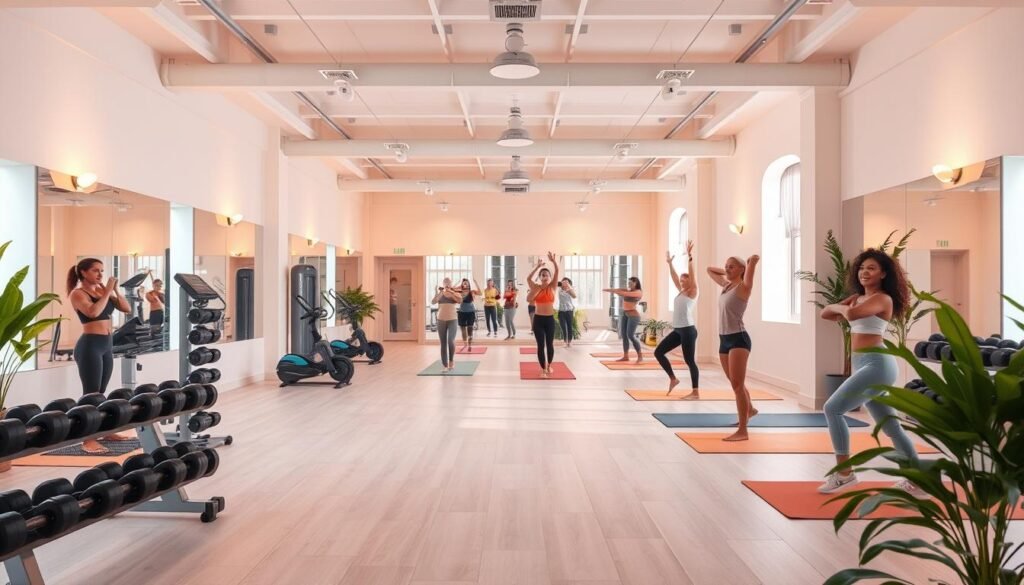Did you know nearly 30% of adults face anxiety disorders at some point? The American Psychiatric Association highlights this. This issue even reaches into gyms, creating *gym anxiety* or “gymtimidation.” It’s especially common among young adults. A surprising 65% of women and 36% of men feel judged or intimidated. This stops them from reaching their fitness goals. We will dive into the causes of gym anxiety, its triggers, and how to beat it.
Key Takeaways
- Nearly 30% of adults experience anxiety disorders, often intensified in gym environments.
- Fear of judgment is a significant barrier, especially for women and younger individuals.
- Effective strategies include gradual exposure and education about equipment.
- A supportive community can significantly reduce gym-related anxiety.
- Research shows exercise can improve both anxiety and depressive symptoms.
Recognizing Symptoms of Gym Anxiety
Knowing the signs of gym anxiety is key to tackling it. Many people, especially those nervous about the gym, may notice different physical and emotional signs. Some common ones include:
- Increased heart rate
- Shortness of breath
- Clammy hands
- Feeling overly self-conscious or scared
- Nervousness about using unfamiliar equipment
About 2 in 5 adults stay away from the gym because they are self-conscious about how they look. Furthermore, 39% avoid exercising due to feeling uncomfortable.
Women often feel this discomfort more, because of social pressures and fear of being judged. Understanding these pressures is crucial. It helps those with gym anxiety become more aware of their feelings. This awareness is the first step to finding ways to cope better.
Common Triggers for Gym Anxiety
Gym anxiety can really get in the way of working out. People might feel they don’t know enough about the gear. This can make the gym seem scary. The worry of being judged is also big.
Feeling judged can make the gym a tough place to be. It’s even harder when there are lots of people around. At times, this worry stops people from even trying to work out.
Social anxiety is a big part of gym fear. It affects quite a few adults in the U.S. Women, in particular, might feel anxious in gym settings. A study in 2018 showed that fear of judgment stops many from working out.
Switching gyms or trying new exercises can also cause anxiety. Being in an unknown place can feel overwhelming. Using areas like the weight room might seem even more daunting.

To deal with gym anxiety, learning more about the gym helps. Taking a tour and asking questions are good steps. Trying classes like spinning or yoga can also help.
Having a regular workout plan builds confidence. Over time, the gym feels more welcoming. For serious anxiety, it’s okay to seek professional help.
Staying active helps with anxiety and boosts mental health. For tips on overcoming gym anxiety, check this resource. Joining fitness groups can also give you support. For more on this, see this guide.
Unpacking the Roots of Gym Anxiety
Gym anxiety deeply affects many people. A lot of adults, especially those who aren’t slim, feel judged at the gym. This judgment makes them feel embarrassed and harms their emotional health. It also stops them from pursuing their fitness goals.
Many feel bad about themselves, which adds to their gym fear. They think they need to look or perform a certain way, which scares them off. Mean comments in the past make it even worse, and not knowing how to use gym gear doesn’t help either.
Setting SMART goals can really help beat these fears. These goals are clear and achievable, which can keep people going. Also, being mindful helps with accepting oneself and staying true to their fitness path.
Having a friend to work out with is great for fighting gym anxiety. They can cheer you on, making the gym a fun place. For those new to the gym, getting there early for classes or asking for a tour can ease nerves. This makes the gym space feel safer and more inviting.

| Factors Contributing to Gym Anxiety | Impact on Individuals |
|---|---|
| Weight-related stigma | Leads to embarrassment and judgment |
| Negative self-perception | Results in fear of judgment and discomfort |
| Unrealistic expectations | Creates barriers to engaging in fitness |
| Lack of experience | Contributes to feelings of inadequacy |
| Previous negative experiences | Affects coping behaviors and emotional health |
Learning about what causes gym anxiety is key. It lets people face these issues head-on, leading to confidence. By doing so, they start a rewarding fitness journey that improves their well-being and strength.
Effective Strategies for Overcoming Gym Anxiety
Several strategies can help beat gym anxiety and boost confidence. By using helpful tips, one can slowly get better at facing gym fears. This makes the fitness journey more fun.
Start Small: Gradual Exposure to the Gym Environment
Start with short gym visits or easy workouts to fight gym anxiety. This slow start lets people get used to the gym without stress. Visiting when it’s less busy helps avoid the worry of being watched.
Getting to know the gym bit by bit makes anxiety easier to handle.
Educate Yourself on Equipment and Routines
Learning about gym gear and exercises helps reduce fear. Gyms like EōS Fitness have virtual tours and online guides. This knowledge makes working out less intimidating and more empowering.
Practice Positive Self-Talk and Mindfulness
Positive talk changes self-doubt to encouragement. Focusing on what you’ve achieved helps with gym anxiety. Mindfulness during workouts improves focus. Accepting fears rather than ignoring them helps too.
About 2 out of 5 gym-goers feel gym anxiety. Celebrating small wins is key to a positive mindset.

| Strategy | Description | Effectiveness |
|---|---|---|
| Gradual Exposure | Short visits to the gym at off-peak hours | High |
| Education | Utilizing online material and virtual tours | Moderate |
| Positive Self-Talk | Turning negative thoughts into positive affirmations | High |
| Mindfulness | Staying focused during workouts | Moderate |
Trying these steps can make someone more ready and brave against gym anxiety. With effort, the gym can become a place of growth and success.
The Role of a Support System in Conquering Gym Anxiety
A strong support system for gym anxiety is key for overcoming fears in the gym. Having friends or a group around makes workouts fun instead of scary. This sense of belonging helps those scared or nervous about going to the gym.
Workout with a Friend for Confidence
Working out with a friend brings comfort and support. Friends offer more than just company. They provide real gym anxiety help by sharing what they know. Having a buddy lets you confidently explore the gym, easing the fear of new places.
Studies show working out together boosts enjoyment and lowers anxiety greatly.
Join Group Fitness Classes for Community Support
Group fitness classes make the gym experience better by offering structure and support. Joining these classes boosts confidence by 50% compared to solo workouts. Instructors in these classes reduce worries by teaching proper routines and building a supportive community.
This community lowers gym anxiety by creating connections and accountability. Being part of such a group has emotional and physical benefits. It encourages motivation and support in fitness goals. Check out this resource for more on fighting gym anxiety.
How Preparation Reduces Gym Anxiety
Getting ready plays a big part in easing gym worries. It helps folks feel sure of themselves and keeps their mind on track. Before going to the gym, taking some steps can cut down on stress and make everything better. We will look into tips that help with planning and what to wear.
Planning Your Workout Schedule to Minimize Stress
Having a workout plan helps fight gym nerves. People should keep these ideas in mind:
- Choose less crowded times: Working out when it’s not busy makes for a nicer setting.
- Set SMART goals: Goals that are clear and reachable give you focus and drive.
- Develop a routine: Knowing your workout eases nerves and keeps you going strong.
- Start with simple exercises: Easy moves like squats and bicep curls help beginners feel comfy.
Choosing Comfortable Gym Attire to Boost Confidence
Picking the right workout clothes boosts your gym confidence. Comfy outfits improve your mood and ease workout stress. Keep these tips in mind:
- Prioritize fit: Clothes that fit well make moving easy and boost your self-esteem.
- Opt for breathable materials: Clothes that keep you cool help you stay focused.
- Express personal style: Wearing what you like makes you feel more you and confident.
Prepping ahead helps create a welcoming space for those with gym fears. Planning your exercises and choosing the right clothes reduces anxiety. This leads to enjoying your time at the gym more.
| Preparation Aspect | Benefits |
|---|---|
| Workout Schedule | Lessens uncertainty, improves focus, and avoids busy times. |
| Comfortable Gym Attire | Lifts confidence, ensures comfort, and positively impacts mood. |
The Benefits of Exercise on Mental Health and Anxiety
Regular physical activity greatly improves mental health and eases anxiety. Just 15 minutes of running or an hour-long walk can lower depression risk by 26%. These activities help release neurotransmitters like dopamine and serotonin, improving focus and attention.
For those struggling with gym anxiety, choosing the right workout can be essential help. Exercise can treat depression as effectively as antidepressants, without unwanted side effects. It boosts self-esteem, cognitive function, and relieves anxiety symptoms.
Cross-movement activities like swimming, dancing, and weight lifting help with PTSD. Outdoor adventures such as hiking significantly lower anxiety. Just 30 minutes of exercise five times a week can immensely benefit both your body and mind.
Some people fit their exercise into weekend sessions and still see major health improvements. Starting with easier activities helps make regular exercise more doable, especially for beginners.
Consistent exercise is key, research agrees. It fights fatigue, boosts energy, and helps with exhaustion. Highlighting the benefits of exercise for mental health is crucial for those dealing with anxiety on their fitness journey.
| Type of Exercise | Mental Health Benefit | Duration |
|---|---|---|
| Walking | Reduces anxiety and depression | 30 mins, 5 times a week |
| Running | Boosts mood and cognitive function | 15 mins daily |
| Swimming | Alleviates PTSD symptoms | Varies |
| Weight Training | Improves self-esteem and energy levels | 30 mins, 3 times a week |
Alternatives to the Gym When Feeling Anxious
Many people feel anxious about going to the gym. Finding other ways to exercise can help them feel better and more confident. Working out at home or doing activities outside can change how you see fitness. It also helps your mind feel better and less stressed.
Home Workouts: Stay Active Without the Stress
Exercising at home lets you stay active without feeling the pressure of a gym. You can use apps and online videos to create a workout that fits you. Try yoga, Pilates, or dancing to ease gym anxiety and hit your exercise goals. You’ll start to enjoy working out and have a healthier view of fitness.
Outdoor Activities: Find Fitness in Nature
Being active outside lets you enjoy nature and keep fit. Hiking, running, or biking gives you fresh air and beautiful sights. This can make you happier and less anxious. One study showed a 50-minute walk in nature greatly lowers stress. Outdoor exercise can feel less stressful than the gym. If you need tips on keeping up with outdoor activities, checking out a reliable source can be useful.
Conclusion
Beating gym anxiety is more than a win for you. It’s a key step to reaching your fitness dreams. About half of Americans feel scared in gyms, from group classes to new machines. It’s crucial to know and face this fear. Understanding what scares you and why helps you make a plan to feel more confident.
To deal with gym worries, start small. Begin with short workouts and slowly do more. Having friends or taking group classes can make the gym feel welcoming, not scary. Knowing how the gym works also eases the fear many call gymtimidation.
Starting this journey changes how you see working out. It becomes fun, not scary. Regular exercise makes you feel good about yourself and healthier overall. With the right approach, anyone can overcome gym anxiety. And they can make their fitness goals come true.